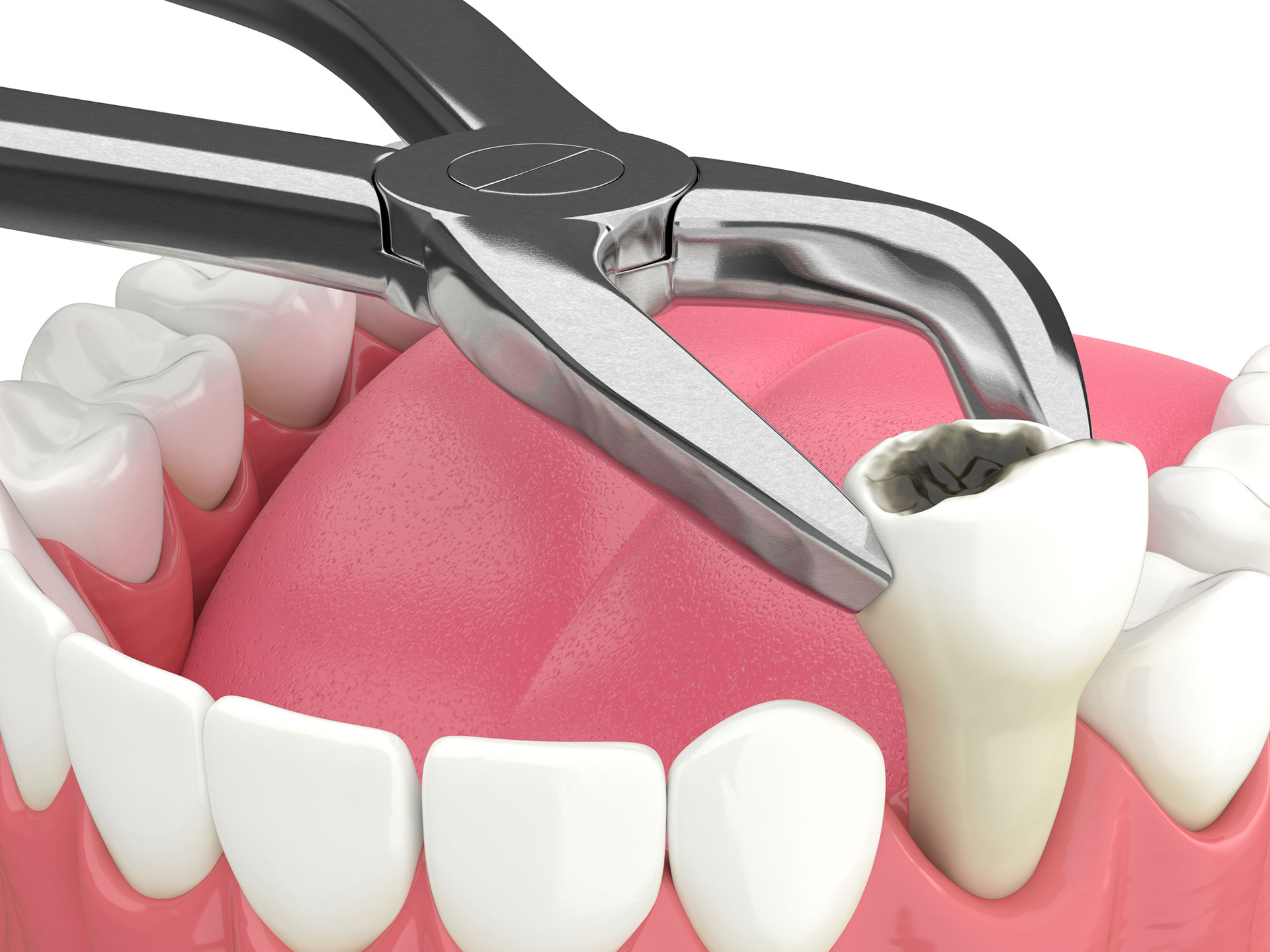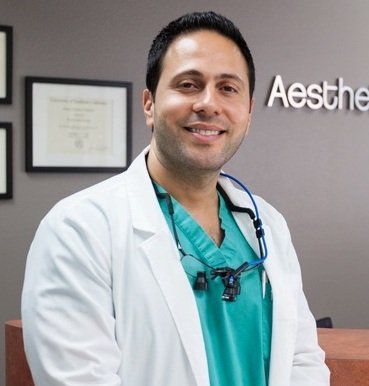Tooth Extractions In Santa Clarita & Valencia, CA
Schedule a Complimentary Tooth Extraction Consultation
Schedule Your Appointment Today Call Now: (661)290-2825Get to the root of your pain. Tooth extraction is an extremely common dental procedure that involves removing a tooth from its socket in the jawbone. Typically, this procedure is necessary when a tooth is irreparably damaged, infected, or causing crowding. Extractions can relieve pain, prevent further dental issues, and prepare your mouth for future treatments.
Extractions are often necessary to ensure the long-term well-being of your smile. Unaddressed issues can cause severe tooth decay, infections, abscesses, or broken teeth. Thankfully, extracting the affected tooth can provide immediate relief from the pain and prevent the spread of infection.
The oral surgeons at our Santa Clarita dentist’s office are equipped with the knowledge and skills to assess your specific condition, determine the need for extraction, and perform the procedure safely with minimal pain or discomfort.

Meet Dr. Soleimani, aka Dr. Pete, a dedicated dentist and father serving Southern California since 2006.
Patients choose Dr. Pete because his care is personalized, pain-free, and his cosmetic and implant dentistry expertise. When he’s not in the office Dr. Pete enjoys all things outdoors, from skiing and hiking to fishing.
Set up a consultation today to learn how Dr. Pete makes every dental visit a positive experience
Check out our Instagram profile to see more of our work before & after pictures and videos.
Benefits of Tooth Extraction
Alleviation of Pain and Discomfort
Tooth extraction provides immediate relief from the pain caused by damaged or decayed teeth that cannot be saved by other dental treatments, enhancing patient comfort and quality of life.
Prevention of Infection Spread
Extracting a severely decayed or infected tooth prevents the spread of infection to other parts of the mouth and body, protecting your oral and systemic health.
Improvement in Oral Health
Removing problematic teeth helps maintain the health of surrounding teeth and gum tissue, preventing further dental issues like misalignment, overcrowding, or jawbone deterioration.
Aid in Orthodontic Treatment
Tooth extraction can be crucial in orthodontic treatments by creating the necessary space for the proper alignment of remaining teeth, especially in cases of overcrowding.
Reduction of Complication Risks
Extracting teeth at risk of complications, such as impacted wisdom teeth, can prevent future problems like cysts, tumors, or damage to adjacent teeth.
Simplicity and Effectiveness of Procedure
Tooth extraction is a straightforward and commonly performed dental procedure with a high success rate, offering a fast solution to problematic teeth.
Preparation for Dental Prosthetics
For those considering dental prosthetics like dentures or implants, the extraction of severely damaged or decayed teeth is often necessary to prepare the mouth for these devices.
Enhancement of Aesthetic Appearance
Removing badly damaged or decayed teeth can improve the aesthetic appearance of the smile, particularly when followed by restorative treatments like implants or bridges.
Dental Emergency: Tooth Extraction
What You Need to Know About an Emergency Tooth Extraction
Are you experiencing excruciating pain? Our emergency dentists are on standby. Find out if you need an emergency tooth extraction.
Read Blog ArticleHow Tooth Extraction Works

What to Expect with Tooth Extraction
The experience and recovery from tooth extraction can be quite different from other dental treatments.
After having a tooth extracted, you may notice changes in how you chew and speak, particularly if multiple teeth have been removed. It’s normal to need some time to adjust to these changes.
Most patients find dental extractions manageable and appreciate the relief from pain or functional issues.
The Day of Extraction
Tooth extraction can often be completed in a single visit, allowing you to focus on recovery soon after.
Your surgeon will first perform a thorough cleaning of your teeth, including flossing and brushing to remove any plaque or food particles around the area where the tooth will be extracted. Local anesthesia is administered to numb the affected area and ensure you are comfortable and pain-free during the extraction. General anesthesia may be used for more complicated extractions.
The dentist then uses specialized forceps to gently loosen and remove the tooth, taking care to preserve as much of the surrounding bone and gum tissue as possible.
Healing After Extraction
Rest is crucial after tooth extraction to aid healing. You’ll be advised to avoid strenuous activity for at least 24 hours to allow the extraction site to recover.
Some discomfort is expected following the procedure, but this is usually manageable with over-the-counter pain relief or prescribed medications. Your main focus should be caring for the extraction site to prevent infection and promote healing.
After your procedure, you’ll receive detailed recovery guidelines, such as using ice packs to minimize swelling, eating soft foods, gradually reintroducing solid food, and caring for any stitches. Contact your dentist if you experience severe pain, prolonged bleeding, or signs of infection in the tooth socket. Healing varies per individual, so adhere to your dentist’s medical advice for a safe recovery.
FAQ: Tooth Extraction
Got questions about tooth extraction? Here are some commonly asked questions and answers.
Does Tooth Extraction Hurt?
During the actual process of tooth extraction, you shouldn’t feel pain because your dentist will use local anesthesia to numb the area around the tooth.
While the tooth is being extracted, you might feel a slight sting or pinch as the needle is inserted, but this is usually brief and tolerable. The sensation of pressure is due to the dentist manipulating the tooth to remove it, but the nerves in the area are numbed by the anesthesia.
Once the anesthesia wears off, you may experience some discomfort or pain. This is normal and usually peaks within the first few hours after the extraction. Your dentist might prescribe pain medication or suggest over-the-counter pain relievers like ibuprofen. Generally, pain after an extraction should subside significantly within a few days. If the pain persists or you experience symptoms like excessive swelling, fever, or pus, contact your dentist, as these could be signs of an infection or other complications.
What is the recovery time for tooth extraction?
Recovery time for a tooth extraction varies based on the complexity of the procedure, the patient’s overall health, and their adherence to post-extraction care instructions.
The first 24 to 48 hours after the extraction are crucial for blood clot formation and the beginning of the healing process. During this period, it’s important to avoid activities that might disrupt the clot, like vigorous rinsing, sucking through a straw, or heavy physical exercise.
Most of the discomfort and swelling usually subsides within the first week, and the gum area usually heals within 3 to 4 weeks. However, the bone where the tooth was extracted might take several months to fully heal and remodel. The time frame for complete healing can be longer in the case of surgical extractions, like impacted wisdom tooth removal.
Will I need a replacement for the extracted tooth, such as an implant or bridge?
Whether you need a replacement for an extracted tooth, like an implant or bridge, depends on several factors
If the extracted tooth is in a visible area, like the front of your mouth, you might want a replacement for aesthetic reasons. The decision might depend more on function if it’s a back tooth.
Certain health conditions and medications can affect your eligibility for implants. Younger patients might opt for more permanent solutions like implants, whereas older patients might prefer less invasive options.
Dental implants tend to be more expensive, but they offer a permanent solution that’s closest to natural teeth. Dental bridges are less expensive but may require the alteration of adjacent teeth.
What are the signs of complications after an extraction?
Some pain and discomfort are normal after a tooth extraction, but if the pain becomes severe or worsens over time instead of improving, it could be a sign of a complication like a dry socket or infection.
A little bleeding and swelling are normal immediately after extraction, but if either one continues for more than 24 hours, or if the bleeding is heavy, it’s advisable to contact your dentist for a follow-up. Other signs of potential infection may include fever, chills, bad taste or foul smell in the mouth, pus at the extraction site, difficulty opening the jaw, or numbness.
How Much Does Tooth Extraction Cost?
The cost of tooth extraction varies depending on factors like the complexity of the procedure (simple, surgical, or impacted) and geographical location.
Generally, simple dental extractions are less expensive than surgical or impacted tooth removals. It’s important to note that insurance can play a significant role in determining out-of-pocket expenses. Most dental insurance plans typically cover a portion of the cost, especially if the extraction is deemed medically necessary.
Patients should ask their dental provider for a detailed cost breakdown, including any additional fees for anesthesia or aftercare. Many dental clinics offer different financing options, making the treatment more affordable.
Our clinic offers 0% financing plans and accepts a wide range of over 10 different insurance providers. Please feel free to reach out to us for insurance coverage, financing options, or a detailed estimate of your upcoming tooth extraction procedure.
Is Extracting Wisdom Teeth the Same As Extracting Regular Teeth?
Wisdom tooth extractions differ from regular tooth extractions due to their position and development.
Wisdom teeth, also known as third molars, are located at the back of the mouth and can be more challenging to access. They are more likely to be impacted, meaning they are trapped beneath the gum line or partially emerge at an angle. Because of impaction and location, wisdom teeth extraction often requires a surgical approach. Unlike simple extraction, which is still considered oral surgery, wisdom tooth extraction may require deep gum incisions or bone removal.
Wisdom teeth are often extracted as a preventative measure to avoid future problems such as crowding, misalignment, or impaction complications. In contrast, regular teeth are typically extracted due to decay, trauma, or gum disease.
Read Article

About Us
At Aesthetic Dental & Specialty Center, we understand that tooth extraction can be a daunting experience. That’s why we’ve created a warm, welcoming environment where every patient feels comfortable and at ease, even those who are apprehensive about dental procedures. Our caring staff and hygienists in Santa Clarita are dedicated to making your visit as stress-free as possible, offering oral-conscious and IV-advanced sedation options for those who need extra relaxation assistance.
If you’re coming from Valencia, Stevenson Ranch, or any surrounding area, our dentistry center is here to provide top-notch dental care to patients of all ages, and we accept most dental insurance plans. We invite you to explore the services we offer and schedule a complimentary consultation to discuss your tooth extraction needs and options.
Let us take care of your dental health with the compassion and expertise you deserve!
Contact Us
Aesthetic Dental & Specialty Center features a comfortable relaxed atmosphere. Our friendly staff and hygienists help put our patients at ease — even the most nervous ones. Our Santa Clarita dentists also provide oral conscious and IV advanced sedation for those patients who need more help to relax.
Whether you need general dentistry services or you have more complex dental needs, our expert dental team serves patients of all ages, and we accept most dental insurance.
No matter where you’re traveling from — Valencia or Stevenson Ranch — Aesthetic Dental & Specialty Center is here to serve you. Take a look at the areas we serve below and schedule a complimentary consultation today!